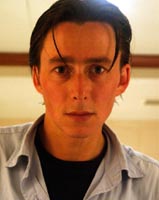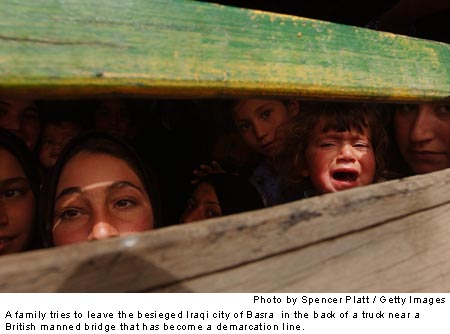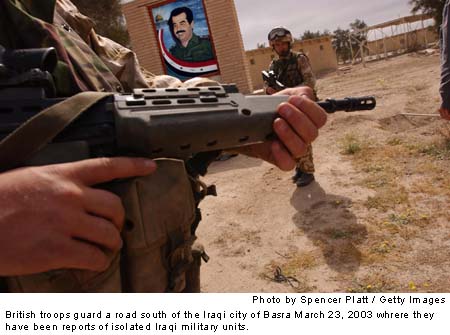|
|
||||
The Brits had felt that this location, a forlorn highway strip littered with shrapnel and mines, would be secure for the night. But just after 2am the battle with the Iraqis intensifies and the British believe that our new location is in peril of being attacked. We line-up our cars in the center lane and gingerly follow orders not to use brake lights and to keep close to the car in front. In case of an attack from either side of the road, we are told to jettison protocol and gun it. After an hour spent driving in near blackness, all the time riding the emergency brake so a not to rear end the faint silhouette of the car in front, we come across a deserted patch of land which we are told will be our new home for the evening. We are assured the area is secure and are beginning to feel like children lost in the night and yearning for comforting words. A French reporter quickly breaks out his satellite phone and walks out to a nearby mound of dirt. Within minutes a British officer walks over and shouts to oblivious reporter ”you idiot, you’re in a minefield.” It’s barely a week into the war and things aren’t going quite as planned. I’m supposed to be checked into the Basra Sheraton by now photographing the joyous victory dances by newly liberated Iraqis. Instead my colleagues and I find ourselves in a precarious cat and mouse game with remnants of the Iraqi military and the dreaded fedayeen fighters who seem intent of sowing mayhem and fear behind the coalition lines. Increasing our predicament, we are all unilaterals, journalists not embedded with the military and technically not legally in Iraq as we all slipped over the border with Kuwait in our personal vehicles, a serious no-no. The coalition forces want little to do with us as many feel our unilateral status could be a cover for dissent over the war. We're a suspicious group of roaming photographers and writers intent on digging up the next My Lai, who can’t be trusted. We live for weeks in our cars and trucks behind the gas station in the southern port town of Umm Qasr. A gnarled border town where the children scream for water by the thousands while the village elders give us those blank looks that don’t easily translate into euphoria over Saddam’s demise. It is behind the gas station, now closed as a result of a lack of fuel in the country, that a small media village emerges. Every evening as Umm Qasr broods in darkness, our world hums with satellite phones and the frantic typing of keyboards. We stay here out of fears for our security. Dubious rumors of angry mobs intent on killing us spread like wildfire at the camp. Not that the dirt lot has much to offer in the way of protection. Fortified by two geese, a rambunctious puppy and a low wall with a rusted gate, it’s not exactly the Pentagon. But for some unspoken reason, we all shell out $40 a night for the privilege of taking our morning sponge baths here. ‘Basra will fall tomorrow’ a colleague says, ‘the Brits are closing in.” It is Basra we are after. That famed southern Shiite stronghold up the road from Umm Qasr, which was so brutally suppressed following a thwarted uprising after the Gulf War. A city I can’t see yet, but which I drive towards every morning, towards a skyline hijacked by plumes of black acrid smoke emanating from recently barraged buildings. It does seem that the British 7th armored Brigade, commonly known as the Desert Rats, are closing in on the city. Everyday we inch a little closer, a little farther up the road, a new vantage point to photograph the shattered souls entering and leaving through a British manned checkpoint on the outskirts of the city. Families stream out by the thousands with all their possessions haphazardly stacked in the backs of trucks and tractors. Men enter the city in trucks bursting with crates of tomatoes and onions, a seasonal staple that is permitted to cross enemy lines.
Basra falls to the British forces sometime on the afternoon of April 6th, or so our short-wave radios inform us. By the morning of the 7th a group of us enter the city after hearing that some other journalists had safely made it in. We pull over on the road into town and put on our Kevlar helmets and flack jackets. After procrastinating for 15 minutes, we make a nervous go for it. As we enter the battered city we immediately stop at a battle scarred Saddam mural depicting the despot in some vain medieval battle motif, where he’s once again vanquished the naïve invaders who dared to challenge his rule. PHOTO: dig4 The contrast of the mural with the burning city and the grumbling British Challenger tanks that now sit diffidently on every Basra street corner can’t be overstated. After only a moment photographing, we’re forced to run for cover behind our vehicles as gunfire rattles from a nearby building. I attempt to make a photo of a television crew crouching beside me, but suddenly feel foolish at as a group of women walk past us seemingly indifferent to the chaos unfolding around them. It dawns on me that this is the spirit of the civilian overcoming the fear of war, of somehow refusing to give into a mindset that has lost all respect for life.
I get in my car and out of curiosity head towards the Sheraton in the city center. Along the way I see Iraqis carrying anything of value out of looted shops and former Bath party ministry buildings. A woman in a black chador carries a decrepit desk on her head. A group of boys sprint as if playing a schoolyard game with the mangled remains of two ceiling fans over their backs.
Recognizing a western reporter, there are slight looks of embarrassment, pleads of no photography, but in the end I see a people hell bent on getting something back for the two decades of madness they were put through. Turning the corner by the river, I look up at the burning and plundered façade of what was the Sheraton hotel. There is no need to stop here, the story has been told. Basra has fallen. Spencer Platt |
|
|
Write a Letter
to the Editor |



